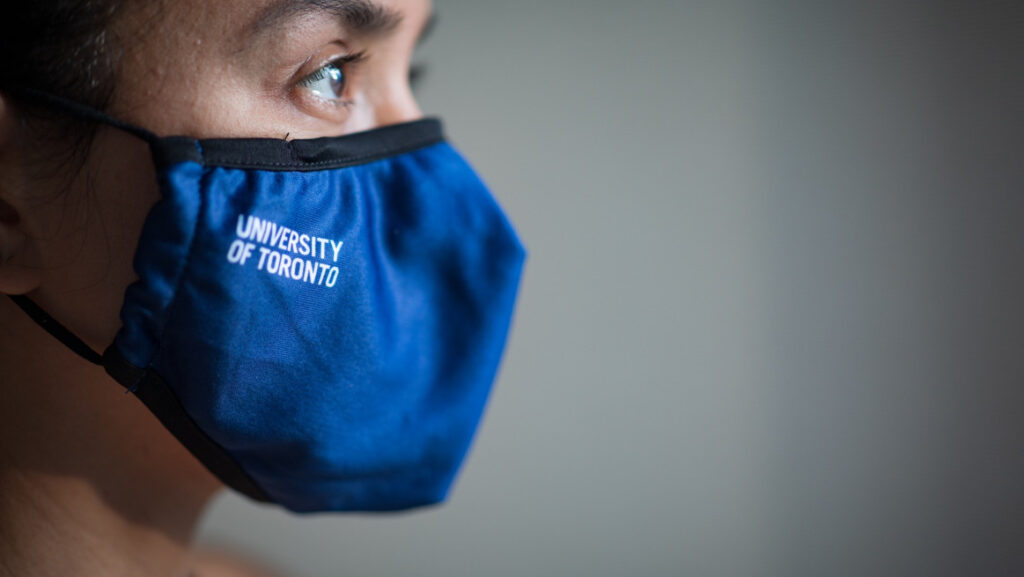‘You are not alone’: Report on mental health during COVID outlines key precautionary steps students can take

By its very nature, the COVID-19 pandemic has been an isolating experience: shutdowns, physical distancing and quarantines have all made maintaining mental health a major challenge.
But, according to a new landmark report, there are key precautionary activities that students can take to help protect their mental health during the pandemic.
“When stress is too great to properly manage our emotions, it can be hard to take proactive steps,” says Professor Gerald Cupchik from the Department of Psychology at U of T Scarborough and lead author of the report.
“We all need resilience to help manage anxiety and apply realistic coping strategies, but there are times when the stress becomes too great and we can end up withdrawing inside ourselves. Collectively, it’s important to find ways to avoid getting to that point.”
The report, which received funding from the Toronto COVID-19 Action Initiative Fund, surveyed 859 students throughout October 2020. It looked at ways students are responding to the pandemic in their personal lives, how they felt about the present and future, and asked them to describe challenges they faced inside and outside of school including coping strategies.
Cupchik says that precautionary measures are activities that students can take to help diminish feelings of isolation and boost confidence in order to cope with negative emotions.
The report outlined ten such activities that students can do including 1) physical distancing; 2) following public health guidelines; 3) healthy sleeping habits; 4) healthy eating habits; 5) connecting with family and friends; 6) maintaining hobbies; 7) exercising; 8) attending to responsibilities such as pets; 9) living in a safe and stable environment; and 10) volunteering to help others.
He says that taking these precautionary measures are helpful because they help focus the mind on something other than sources of stress, and begin the process of letting emotions out. They also allow for a sense of taking control over aspects of your life.
“Take an artistic endeavour like dancing, painting, or playing a musical instrument. These can be a form of self-care because they are such good diversions,” he says, adding that reading a book or diving into a Netflix series can have a similar positive effect.
The report found that students most at risk for mental health were also at a greater risk for poor personal health and experienced greater difficulty focusing on everyday activities. They also tended to feel most threatened by the pandemic, got most of their information from social media (as opposed to the news or government sources) and were less likely to receive support at home. They were also less likely to take precautionary measures.
“We are not saying that students who don’t take these steps are at fault. Far from it. It’s that those who are at-risk are the ones who need our help the most in overcoming feelings of isolation, burnout and helplessness,” he says.
Elsa Kiosses, a health promotion nurse at U of T Scarborough’s Health & Wellness Centre, says counselling support services are available for students 24/7 during the pandemic. She says that students can seek support for feelings of anxiety and stress, balancing work and school, stress due to financial challenges, feeling lonely or isolated, and tension at home with family, friends or roommates, among other things.
“It’s important we continue to work together to create opportunities for students who are not coping, who are stuck in this bubble, to reach out,” says Kiosses, who helped Cupchik with the report.
Kiosses also encourages all staff, faculty and students to educate themselves by taking mental health training programs such as Identify, Assist, Refer (IAR) and to address the lingering stigma attached to seeking help. She says that support can also go out to student groups, including clubs and departmental student associations, to provide more opportunities for students to connect.
“As a supportive community, we can all do our part to reach out to students and connect them to resources where they can feel empowered to make positive decisions in their lives.”
Cupchik echoes that sentiment, saying ultimately it comes down to “building a landscape of compassion” where everyone can seek support from a source they feel most comfortable.
“It means letting students know you are not alone, that you can reach out to other students, or to faculty and staff for support without fear of not being heard.”
Article By Don Campbell
A full list of mental health services and resources available to UTSC students can be found on the Health & Wellness Centre website.
For same day appointments at the Health & Wellness Centre call 416-287-7065 or email healthservices@utsc.utoronto.ca
If students want to speak to a counsellor or need support, help is available 24/7 at #UofT My SSP. Call 1-844-451-9700 or download the app on the Apple App Store or Google Play.
U of T tri-campus student mental health resources or Navi, U of T’s mental health virtual wayfinding service.
For staff and faculty, supports are available through the Employee and Family Assistance Program, or please call 1-800-663-1142.



